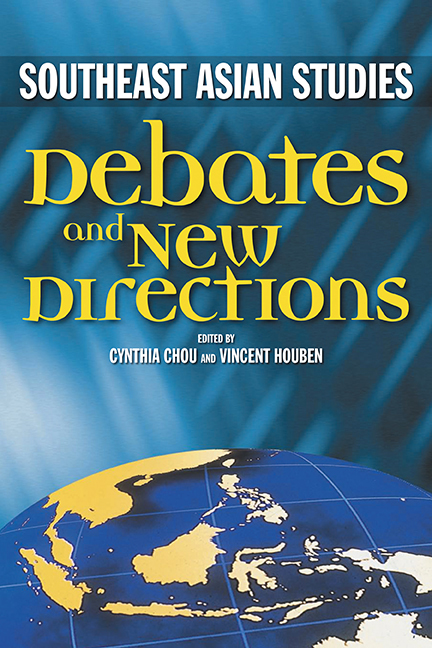Book contents
- Frontmatter
- Contents
- List of Contributors
- Preface
- 1 Introduction
- 2 Southeast Asia: Personal Reflections on a Region
- 3 Region, Academic Dynamics, and Promise of Comparitivism: Beyond Studying ‘Southeast Asia’?
- 4 Towards Multi-Laterality in Southeast Asian Studies: Perspectives from Japan
- 5 The Academic's New Clothes: The Cult of Theory versus the Cultivation of Language in Southeast Asian Studies
- 6 Rethinking Southeast Asian Politics
- 7 Reconceptualizing Southeast Asian Studies
- 8 Southeast Asian History: The Search for New Perspectives
- 9 Film, Literature, and Context in Southeast Asia: P. Ramlee, Malay Cinema, and History
- Bibliography
- Index
4 - Towards Multi-Laterality in Southeast Asian Studies: Perspectives from Japan
Published online by Cambridge University Press: 21 October 2015
- Frontmatter
- Contents
- List of Contributors
- Preface
- 1 Introduction
- 2 Southeast Asia: Personal Reflections on a Region
- 3 Region, Academic Dynamics, and Promise of Comparitivism: Beyond Studying ‘Southeast Asia’?
- 4 Towards Multi-Laterality in Southeast Asian Studies: Perspectives from Japan
- 5 The Academic's New Clothes: The Cult of Theory versus the Cultivation of Language in Southeast Asian Studies
- 6 Rethinking Southeast Asian Politics
- 7 Reconceptualizing Southeast Asian Studies
- 8 Southeast Asian History: The Search for New Perspectives
- 9 Film, Literature, and Context in Southeast Asia: P. Ramlee, Malay Cinema, and History
- Bibliography
- Index
Summary
In this chapter, I consider two issues related to changing trends in the global academic mapping of Southeast Asian studies, and issues relating to the academic practices of the late twentieth to the twenty-first century. What are the difficulties we are facing in Southeast Asian studies, and how can we as Southeast Asianist scholars, whether in Southeast Asia, or other parts of Asia, Europe, Australia, or the United States, re-position ourselves to the changing academic mapping, reflecting on each of our own position in the evolving “ecology” of the global academic endeavour. Each of our different academic traditions has evolved with respective historical positioning towards “Southeast Asia”, its own “ecology of scholarship” (as meant by Anderson in his 1992 comparison of pre-war Southeast Asian scholarship of the Orientalist kind with the mostly American dominated post-war university-based scholarship), its own language of scholarship, and its special epistemological tendencies in the scholarly practices. We therefore stand in different positions in varied moments in our respective academic traditions. Yet, just as some of our difficulties and tendencies are shared, so should we be able to find points of convergence and exchange once we are more aware of where each of us stands.
In the first half I will discuss the academic tradition of Southeast Asian studies in Japan, reflecting on its position, and then consider the up-coming interest on Southeast Asian studies in the region itself. Based on the discussion in the first half, in the latter half I will consider some problems, then suggest possible topics and orientations to overcome such problems, and to find ourselves in a globally better attuned Southeast Asian studies.
THE JAPANESE CONTRIBUTION: REFLECTIONS
For scholars situated in Japan such as myself, the immediate conditions surrounding Southeast Asian studies today are perceived rather differently from scholars based in Europe or America or in Southeast Asia itself. Interest in “Southeast Asia” as a region and the study of it is far from dwindling in Japan.
- Type
- Chapter
- Information
- Southeast Asian StudiesDebates and New Directions, pp. 65 - 85Publisher: ISEAS–Yusof Ishak InstitutePrint publication year: 2006



